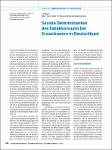Soziale Determinanten des Tabakkonsums bei Erwachsenen in Deutschland
Lampert, Thomas
Erkenntnisse über soziale Unterschiede im Rauchverhalten sind eine wesentliche Voraussetzung für eine zielgruppenorientierte Tabakprävention. Mit den in Deutschland verfügbaren Daten lässt sich bezüglich der Erwachsenenbevölkerung zeigen, dass Personen mit niedriger Bildung, niedrigem Berufsstatus und geringem Einkommen vermehrt rauchen. Hohe Rauchquoten finden sich außerdem bei arbeitslosen und alleinerziehenden Männern und Frauen und in bestimmten Migrantengruppen. Ein Vergleich zwischen den Bundesländern weist auf einen engen Zusammenhang zwischen der Rauchquote und der Armutsbetroffenheit hin. Für den Zeitraum von 1998 bis 2006 lässt sich zeigen, dass die sozialen Unterschiede im Rauchverhalten zugenommen haben, und zwar insbesondere bei Frauen. Zusammenfassend sprechen die Ergebnisse dafür, den Erfolg der Tabakprävention auch an der Verringerung sozialer Unterschiede im Tabakkonsum festzumachen. Findings on social differences in smoking behavior are an essential prerequisite for target-group-specific tobacco prevention. Using the available data on the adult population in Germany, it can be shown that people with little education, low occupational status, and low income are more likely to smoke. Smoking rates are also high among unemployed and single-parent men and women and in certain immigrant groups. A comparison between the federal states points to a strong correlation between smoking rate and poverty. It can be shown that the social differences in smoking behavior grew, especially among women, during the period from 1998 to 2006. Thus, the results suggest that the reduction of social disparities in tobacco consumption should also be a measure of the success of tobacco prevention.
No license information

